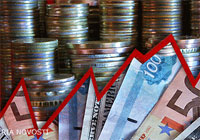No, Russia Isn’t Going Broke Any Time Soon

(Bloomberg – bloomberg.com – Mark Gimein – April 3, 2014)
Mark Gimein is Companies and Markets editor at Bloomberg.com, and lead writer for the Market Now blog and newsletter.
Russia finally succeeded in selling government bonds this week, at a fat yield of 8.93 percent. This comes after four failed auctions since the Crimea occupation started. Last week, the government had to resort to selling untradeable notes to Russian banks and pension funds. Those funds and banks presumably accepted them with the enthusiasm and alacrity once reserved for Soviet five-year plans.
If this gives anyone the impression that sanctions and the weight of world opinion are crippling the Russian economy, it’s premature. Careful readers who recall the European debt crisis might look at the massive interest rates Russia is now forced to pay and think that we’re witnessing economic collapse. Russia now appears to be paying more to borrow than Spain or Italy debt were at the height of the European debt crisis.
There’s a big caveat here: The bonds we’re talking about are ruble denominated. And things look very different when you look at dollar-denominated bonds. For instance, the yield on 10-year ruble denominated bonds is now 8.88 percent. Meanwhile, the yield on 10 year U.S. dollar bonds is a much lower 5.03 percent.
So a key part of what’s happening here is that bond markets are predicting the ruble will fall further, not that Russia is suddenly likely to default. It’s really exchange-rate risk that’s making Russian bonds unappealing. That seems like the market is making a reasonable appraisal of Russia’s prospects: Sanctions are not going to bring about default – or, for that matter, regime change – though they may make Russia a more difficult place to do business.
Even if world reaction to the Crimea occupation has that (relatively modest) effect, it doesn’t follow that the state of the economy will be much of an influence on Vladimir Putin. One assumption behind the West’s dealings with Russia is that Vladimir Putin is motivated by the threat of economic losses (or perhaps at least by personal financial losses for his inner circle. That’s a very big assumption). It brings to mind some lines in Nicholas Thompson’s New Yorker profile of Josef Stalin’s daughter, Svetlana Alliluyeva: Stalin “hadn’t used it, didn’t need it, and didn’t care about it.”
In recent years Putin has done plenty of damage to Russia’s economy; as Bloomberg Businessweek’s Joshua Yaffa detailed, spending $51 billion in the biggest and most-corruption ridden Olympic spending spree wasn’t the most economically efficient use of government funds. For Putin that appears to be the cost of projecting Russian power. And at the moment, that cost seems to be quite manageable.
Russia’s stock market fell immediately after the incursion into Crimea. Since then, though, the market has recovered most of the loss (you can see the chart below). Russians have seen the market bounce back from much bigger drops before. So far, Russia hasn’t given any indication that he’s susceptible to the economic pressure the West is bringing to bear.
On the contrary: Western Europe and even Ukraine (which, believe it or not, has said it will keep paying interest on Russian loans even in the midst of a near-war) have sent signals that they need Russia at least as much as Russia needs them. The conflict over Ukraine threatens as much economic harm for Europe as for Russia. And Putin likely cares about that harm less than the West does.
Article ©2014 Bloomberg L.P. All Rights Reserved. Article also appeared at http://go.bloomberg.com/market-now/2014/04/03/no-russia-isnt-going-broke-any-time-soon/
